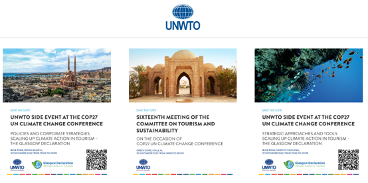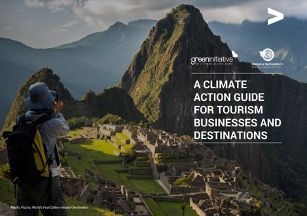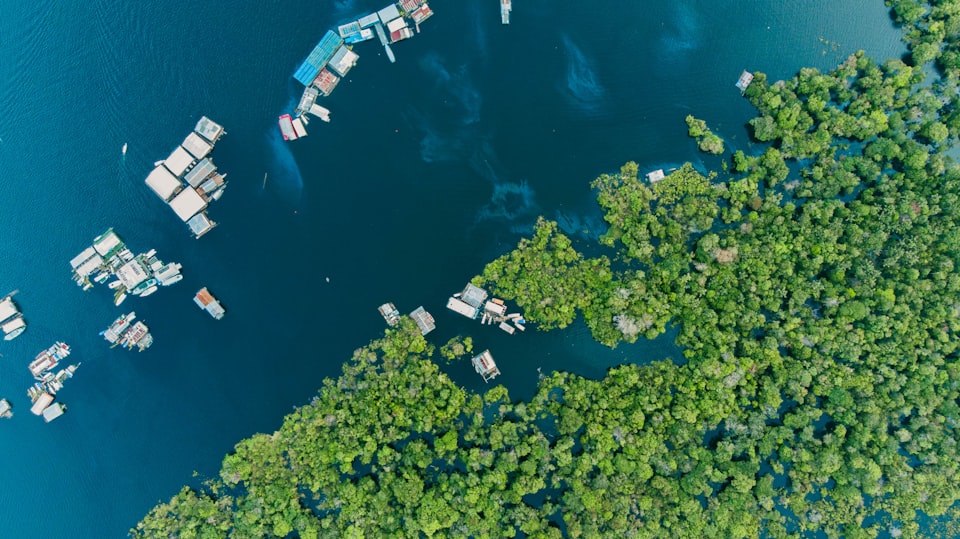The resumption of Brazil's international insertion raises expectations for Brazilian tourism to position itself in the face of the growing challenge of the climate emergency.
With the closing of the 27th Conference of the Parties to the United Nations Framework Convention on Climate Change (COP27), in Egypt, the beginning of Brazil's international reengagement as a protagonist of climate issues was marked [1] . In this context, we were left with the question: how will Brazilian tourism, largely absent so far, position itself in the face of the growing challenge of the climate emergency and the heated global discussion?
Continuing the work started at COP26, when the Glasgow Declaration for Climate Action in Tourism was launched [2] , the World Tourism Organization (UNWTO), in partnership with key actors and global networks - such as One Planet Network, Sustainable Hospitality Alliance, Tourism Declares, Green Initiative - led two days of discussions and events focused on the travel industry in Egypt.
Public managers, including tourism ministers from countries such as Mexico, Spain, Croatia, Angola and the Bahamas and private managers, especially CEOs of groups such as Intrepid Travel and Iberostar were present at the discussions on the exchange of experiences and tools to be improved and applied for the measurement, decarbonization and transformation of the tourism sector based on climate actions. The central themes of the reflections included methodologies and tools for measuring greenhouse gas emissions and decarbonizing tourism activities, repeating Glasgow, but bringing novelties such as the need for regeneration and the race for financing for the green transition, especially in developing countries.
Improving ecosystems and solutions that 1) measure greenhouse gas emissions, 2) decarbonize the tourism economy, and 3) strengthen ecosystems and promote adaptations to the vulnerabilities of communities and regions is the objective set out by the leaders of the organizations involved in the articulation of the Glasgow Declaration for Climate Action in Tourism.
Although consensus was reached at COP27, especially related to loss and damage, and financing mechanisms against extreme events, little progress was made on global warming goals. No progress has been made in relation to fossil fuels, one of the biggest villains in polluting gas emissions.
Peter Thomson, UN Secretary-General's Special Envoy for the Oceans, made a provocation to tourism leaders [3] : "We are on a true highway Highway to Hell "), the 3 degrees Celsius global temperature increase. We have the option of the detour, a bumpy, narrow and rocky road that will take us to 1.5 C. If we go forward, tourism becomes a wicked problem , that is, a big problem. If we take the detour, despite the difficulties, we can all save ourselves." Thomson's reflection, that The path will not be easy, nor cheap, it was completed without leaving any doubts: it is not possible to follow the same route that brought us here.

Among the highlights discussed and presented by the tourism sector, there was not Brazil. Although Brazilian companies and the Tourism Foundation of Mato Grosso do Sul have publicly committed to the commitments of the Glasgow Declaration [1] , national signatories are still few, recent and have not led in benchmarks or applications of climate solutions. The Brazilian government (with the exception of the State of Mato Grosso do Sul), as well as associations representing tourism, did not have a notable presence.
Releases as the Green Initiative guide A Climate Action Guide for Tourism Businesses and Destinations, for destinations and tourism businesses, indicate that there is a developed and accessible framework for solutions and practical actions for the sector. The Green Initiative is responsible for the certification of Machu Picchu as the first carbon neutral destination in the world and also operates in Bonito-MS, in the process of the same certification that tends to lead the destination of Mato Grosso do Sul to become the first carbon neutral in world ecotourism. In addition, the network Regenerative Travel launched discussions focused on providing practices so that sustainable and, above all, regenerative tourism, gains scale through partnerships and more collaboration between tourism agents.

By observing the repercussion of this COP in national and international media (including in analyses by renowned experts such as Rockstrom)4, the attention to the Brazilian delegation of the elected government was evident. However, this delegation was present in the space intended for civil society, indigenous peoples and in numerous panels, but not in tourism. Although Brazilian tourism is not the only one in relation to delays and recent discontinuities in facing the challenges imposed by the climate crisis, it is evident that it is falling short of other sectors that are already engaged in a strategic and practical way, such as finance.
If the commitments assumed by Brazil are to be fulfilled, this isolation will not be possible for national tourism.
In the guidelines launched during the elected government's campaign, there is an axis dedicated to the theme: Axis 2: Sustainability – facing crises, resilience and climate action . Once expectations are fulfilled, Brazilian tourism may no longer be a major absentee at COP28, and future COPs. We are cheering. What about you?
SOURCES
New institutions in Brazil joined the Glasgow Declaration: https://www.oneplanetnetwork.org/organisations/reserva-santo-antonio and https://www.oneplanetnetwork.org/organisations/mato-grosso-do-sul-tourism-foundation
https://unfccc.int/un-climate-change-pavilion-cop-27 - UN Climate Change Pavilion COP 27 Programme
UNWTO AT COP27: UNITING TOURISM AROUND TANGIBLE CLIMATE ACTION PLANS: https://www.unwto.org/news/unwto-at-cop27-uniting-tourism-around-tangible-climate-action-plans
WEF - The promise and challenges of sustainable travel products - Nov 9, 2022. https://www.weforum.org/agenda/2022/11/sustainable-travel-and-tourism/
[1] Professor Eduardo Viola's analysis of President-elect Luiz Inácio Lula da Silva's participation in COP27: https://youtu.be/XndAwFbgSJM
[2] More information on the links between the climate crisis and tourism and on this statement in this article LETS » Climate Change and Tourism: challenges and opportunities in Brazil" here and in the video of the LETS meeting on the topic here .
[3] https://youtu.be/GEP4Y3meCY8
4 - Johan Rockstrom at COP-TRANSFORMERS │Breaking More Boundaries - available at: https://www.youtube.com/watch?v=I0jntr5yvU4




